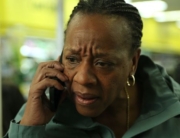With 20th Century Women, Mike Mills pays sympathetic tribute to his mother’s life, much as his Beginners (2011) did for his father, as Mills stated at the press conference for its world premiere at the New York Film Festival.
Like Mills’s mother, Dorothea Fields (Annette Bening) was born in the 1920s and grew up shaped by the Depression. Dorothea still styles herself like her teen idol, Amelia Earhart, and trained during World War II to be a pilot like her. She got as far in a man’s world as a corporate drafting room, where she met her husband and where she returned to after their divorce so she could support their son, Jamie (Lucas Jade Zumann).
The story takes place in 1979 when Jamie is 15, and Dorothea, at 55, seems to be losing her confidence as her son and the world around her in Santa Barbara, California, are going through more changes than she can handle. Much easier to grasp is her daily monitoring of her stock portfolio. For movies, she’s immersed in nostalgia for the past when cigarettes weren’t bad for you—there’s a lot of Bogart and Casablanca references, and cigarette smoke. In addition, her beloved old car bursts into flames, and her 1905 house is in constant need of repair. The surprisingly hip and flexible Dorothea seems more like the frankly curious single mother in The World According to Garp (1982) than a real woman her age (even though she is closely inspired by Mills’s mother), and she decides the most efficient solution for all these problems is to rent out a room to a woman closer to her son’s age and to hire a handyman. Together they can become Jamie’s life advisors.
Abbie Porter (Greta Gerwig), born 1955, is an artist who has moved out west from the New York punk scene, and its music envelopes her wherever she is. She has sought a change of scenery because she has also had to face her mortality, with a crisis some baby boomers first faced in the 1970s: she’s a “DES daughter,” among the women whose mothers were prescribed Diethylstilbestrol to purportedly prevent miscarriages and who were developing a rare cancer of the vagina/cervix. (At the other fertility extreme, Jamie also usefully learns from his visits with her to the ob-gyn about newly available home pregnancy testing kits.) Abbie’s coping mechanism is turning her life into an art project of constantly photographing everything around her, which seems a bit too precocious and ahead of its time.
The hunky handyman fixing up the house, William Saunders (Billy Crudup), is a leftover hippie into free love and meditating, so he’s catnip to women. He is first assigned to teach Jamie to renovate, but Jamie is distracted by the frequent visits from his childhood friend Julie (Elle Fanning), who, at almost 18, has blossomed into a beautiful young woman who prefers reading new feminist guides such as Our Body Ourselves and Sisterhood Is Powerful to being in the teen therapy groups her mother runs. (Julie’s coming in and out of Jamie’s bedroom at all hours seems more like Dawson’s Creek than reality.)
Jamie experiences each woman’s intellectual and cultural touchstones, like listening to Abbie’s punk mix tape and going out with her to a club (though Gerwig acts, dresses, and wears make-up more like Annie Hall than, say, the grungier punk of Debbie Harry.) He gets pulled into Abbie’s and Julie’s individual drama since each confides in him what now would be considered TMI, and each becomes jealous of the other’s hold on him as they mix and match their attachments. Dorothea more and more narrates like a ghost warning of the future, heavily symbolized by the ensemble gathering to watch President Jimmy Carter’s “Crisis of Confidence” speech on July 15, 1979.
Thankfully, everybody feels a bit foolish by the end from trying to adjust to the times, as all their trajectories intersect in and outside the house. They narrate their futures that are full of even more changes, so it’s possible they have learned some lasting lessons in this preciously researched, suburban version of late-1970s California.







Leave A Comment